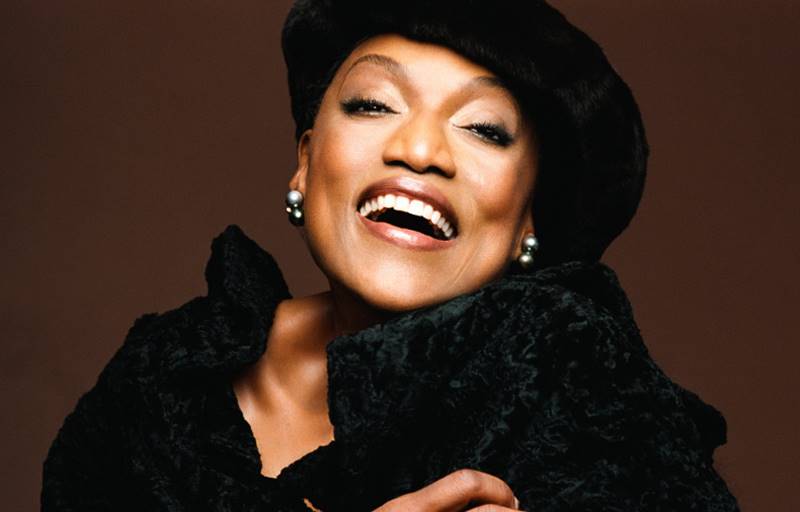 Soprano Jessye Norman.
Soprano Jessye Norman.
By Jae-Ha Kim
Chicago Sun-Times
May 19, 2002
It’s never a good sign when a diva doesn’t like the way you address her. For instance, if you refer to opera star Jessye Norman as “Jessye,” she has no qualms about expressing her distaste.
“That’s Miss Norman,” she tells the reporter in a deliciously regal voice that sounds much deeper than her sweet soprano singing voice would indicate.
Make no mistake about it. This woman is a diva in the best sense of the word. She demands respect, but also is generous about returning it. She is smart, vivacious, talented and very funny. If you ask nicely, she may even record an outgoing answering machine announcement for you. A self-proclaimed fan of all types of music, Norman–er, Miss Norman–has tackled spirituals, French chansons, German lieder and jazz.
“I have always been drawn to things other people might consider unusual,” says Norman, 56. “I’m always taken by the text and beautiful melody. It’s not important to me who has written it. It’s just more reasonable to have an open mind about what beauty is. It’s important for classical musicians to stretch and think beyond the three B’s [Bach, Beethoven and Brahms]. They were wonderful composers, but they went to the great beyond a long time ago. There’s lots of music that will live for a very long time.”
And then there’s heavy metal.
“One can say the world of heavy metal is safe from me,” she says, laughing. “I respect what those musicians do, but it’s not something that suits me. It’s wonderful when people try to do things that are different, but sometimes it doesn’t work. I had the opportunity to sing with Bon Jovi and Sting [for fund-raising events] and that was so much fun. The more one is able to inject joy into the seriousness of our lives, the better it is for everyone.”
Norman–who is the youngest recipient of the Kennedy Center Honors–has an orchid named after her and more than 30 doctorate degrees. As a lifetime member of the Girl Scouts of the United States of America, she also is an avid seller of Girl Scout cookies.
Not that all her fans are impressed by her achievements.
“There was this one little girl who was about 5 years old who looked right at me and said, ‘You have a pretty voice,’ ” Norman says. “I said, ‘Thanks.’ She was still standing there looking at me. Finally, she sort of pulled on my dress and said, ‘Do you know anybody really famous like Michael Jackson?’ I told her I had said hello to him but I couldn’t say I really knew him. She was so unimpressed. I thought that was wonderful. Some people consider me to be well-known, but to this little girl, I was just a lady who had a pretty voice.”
The kindergartner wasn’t the only one who likes her voice. Some of her pop music friends–whom she discreetly refers to but never reveals–are opera groupies.
“I have become acquainted with some very well-known pop artists, and the thing that is interesting to me about them is they are very humble and awed by classical music,” she says. “Even though they’re selling millions of records, they have a longing for immortality. They want to write something that has the respect of an opera by Wagner.”
Ask whether she may be referring to Michael, J-Lo or Sting, and Norman laughs heartily. Her lips are sealed.
Born in Augusta, Ga., Norman learned to play the piano as a toddler and sang in public at 6. She pursued formal music studies at Howard University, the Peabody Conservatory and the University of Michigan before making her operatic debut in a 1969 production of “Tannhauser” at the Deutsche Oper Berlin.
That she was a young African-American woman entering the very white world of opera didn’t faze her. As she has often said, “Pigeonholing is only interesting to pigeons.”
“I was raised in a very nurturing atmosphere, but I also wasn’t singled out as being especially talented,” Norman says. “Everyone was very kind about my abilities, but I was part of a group of kids in Augusta where I was completely interchangeable. If one of us couldn’t show up to sing, then the other person would take our place. It kept us grounded. We knew we had talent, but it was not exploited in a way that made us think we were more special than our friends. It was a very healthy, humbling way to grow up. Everybody has a gift of some sort and some of us were fortunate enough to have help nourishing it.”
These days, Norman’s fame grants her perks of stardom. But she says her life is relatively simple. She drinks liters of water, eschews red meat and meditates.
“There’s nothing relaxing about going on stage singing without a microphone before thousands of people,” she says. “I just need silence. I create that for myself. I can have silence in Grand Central Station.”
Unfortunately, she sometimes can’t get that silence at her own shows.
“I wish audiences would consider that people on stage can hear them quite well,” Norman says. “A lot of us spend so much time at home at our computers or in front of our TV sets, we have forgotten there is a different decorum in a public theater. Covering the mouth when you cough really does a good job of muffling the sound. We really do appreciate that effort.”
Tip well taken, Miss Norman.